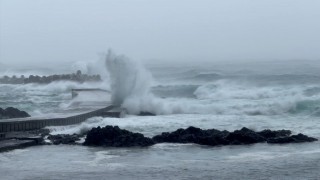Loading
Search
▼ Typhoon Buffets Japan's Pacific Coast, Causing Transport Disruption, Power Cuts
- Category:Other
A very strong typhoon buffeted Japan's Pacific coast with fierce winds and heavy rain on Friday, forcing the cancelation of hundreds of flights and trains in the Tokyo area and leaving over 4,000 homes without power.
Located about 300 kilometers south of Tokyo, Typhoon Ampil was packing gusts of up to 216 kph as it headed north, the Japan Meteorological Agency said.
The eye of the typhoon was not expected to make landfall, instead barreling north-eastward up the Honshu coast and skirting the Tokyo region, home to around 40 million people, before heading back into the Pacific from Saturday.
The JMA rated the weather system as "very strong", one notch below its highest category of "violent typhoon", with maximum wind speeds of 105 knots (195 kmh).
The agency warned people they "should be on high alert for storms, high waves, landslides and flooding" in a social media post.
The U.S. military's Joint Typhoon Warning Center forecast maximum sustained wind speeds of 110 knots and gusts of 135 knots off the coastal Chiba region east of the capital.
Over 4,000 households in Tokyo's neighboring prefectures, mainly Chiba, were without power as of Friday morning due to the typhoon, according to the utility operator.
All Nippon Air canceled 335 domestic and international flights on Friday, with more planned for Saturday, affecting about 72,000 passengers. Japan Airlines has so far scrapped 361 flights, hitting 57,000 customers.
Major parts of Japan's network of bullet train services were also closed Friday -- including the busy section between Tokyo and Nagoya -- while Tokyo Disneyland's operator closed the park from 3 p.m.
The typhoon comes as Japan marks the obon holiday week when millions return to their hometowns, and days after Tropical Storm Maria dumped record rains in parts of the north.
"We will check our phones for any information on the internet and if the typhoon seems OK, then we'll go outside," said Isamu Teruya, 47, a visitor from Saga Prefecture who arrived in Tokyo on Thursday. "If the rain is really bad, then we will stay inside our hotel and relax."
Typhoons in the region have been forming closer to coastlines, intensifying more rapidly and lasting longer over land due to climate change, according to a study released last month.
Researchers from universities in Singapore and the United States analyzed more than 64,000 modeled historic and future storms from the 19th century through the end of the 21st century to come up with the findings.
© 2024 AFP
- August 16, 2024
- Comment (0)
- Trackback(0)


